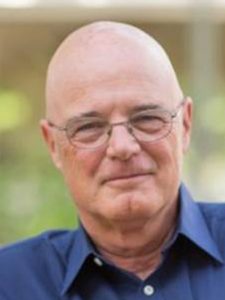A priest, a rabbi and a public theologian walk into a bar …

Never heard of a public theologian? The Rev. Brian D. McLaren is called to be one.
“A public theologian brings the resources of their theological tradition to public life,” he said. “For the last 14 years, I have been called to use my resources to address public issues like climate change, racism, economic injustice and politics.”
McLaren, an author, speaker and public theologian, will be the chaplain at Chautauqua Institution for Week Eight. His theme for the week is “Reframing Faith and Politics.”
“I want to model preaching that is trying to reform the interaction of religion and public life,” he said.
He will preach at the 10:45 a.m. EDT service of worship and sermon on Sunday, Aug. 16, on the CHQ Assembly Video Platform. His sermon title is “Dismantling Supremacy.”
He will give the homily at the 9:15 a.m. EDT Monday, Aug. 17, through Friday, Aug. 21, morning devotional services on the Video Platform. His homily titles include, “A New Declaration of Interdependence,” “Doing What is (Still) Doable,” “Preparing for the Worst,” “Working for the Best” and “Joining God.”
Asked about the separation of church and state in society, he said, “I am a firm believer in the separation of church and state but it is impossible to separate religion from public life. Religion shapes our values, our vision of what is desirable. We bring that spiritual formation to the voting booth and elected office.”
McLaren said the Constitutional founders were trying to avoid the European situation “where a single church hierarchy put a decisive thumb on the political scale. That is what many people are trying to model, a healthy way of integrating religion and public life.”
The challenge is to know what is healthy. It has been said that the best antidote for bad religion is good religion.
An example of bad religion was the support of slavery by white churches. “I grew up during the Civil Rights Movement and heard sermons that to be a good Christian, you don’t get involved in politics. I think it was Abraham Joshua Heschel who said, ‘Silence supports the oppressor,’” McLaren said.
He continued, “Our problem in the United States is that we have religious people who are afraid that the government wants to control religion and those in government who think religious people who want to control the government.”
In his book, Everything Must Change, McLaren wrote about four crises facing the human race: the planet or climate change; poverty or economic inequality; peace or the possibility of violence and war; and politics and religion.
“You can’t solve the first three without the last one. Religion and politics have to line up to help address the other threats,” he said.
Again, he gave the example of white churches that supported slavery. Still, it was a small movement of abolitionists, “who may have left the organized church but were driven by a spiritual vision to turn the tide before the Civil War and support Reconstruction,” he said.
Although they were thwarted, their impulse reappeared in the Social Gospel Movement and the Civil Rights Movement. “What happens between politics and religion is part of the human struggle,” he said.
A former college English teacher and pastor, he is a passionate advocate for “a new kind of Christianity” — just, generous, and working with people of all faiths for the common good.
McLaren is a faculty member of The Living School, which is part of the Center for Action and Contemplation, and he co-leads the Common Good Messaging Team, which is part of Vote Common Good. An Auburn Senior Fellow and a leader in the Convergence Network, he has developed a training/mentoring program for pastors, church planters, and lay leaders called Convergence Leadership Project. He works closely with the Wild Goose Festival, the Fair Food Program’s Faith Working Group, and Progressive Christianity.
His most recent joint project is an illustrated children’s book, Cory and the Seventh Story, and his current and upcoming writing projects include The Galapagos Islands: A Spiritual Journey and the forthcoming Faith After Doubt and Do I Stay Christian?
McLaren graduated from University of Maryland with bachelor’s and master’s degrees in English. From 1978 to 1986, McLaren taught college English in the Washington D.C. area, and in 1982, he helped form Cedar Ridge Community Church, an innovative, nondenominational church. He left higher education in 1986 to serve as the church’s founding pastor and served in that capacity until 2006. Active in networking and mentoring church planters and pastors since the mid-1980s, he has assisted in the development of several new churches.
This program is made possible by the Edmond E. Robb-Walter C. Shaw Fund & the Randell-Hall Memorial Chaplaincy.




